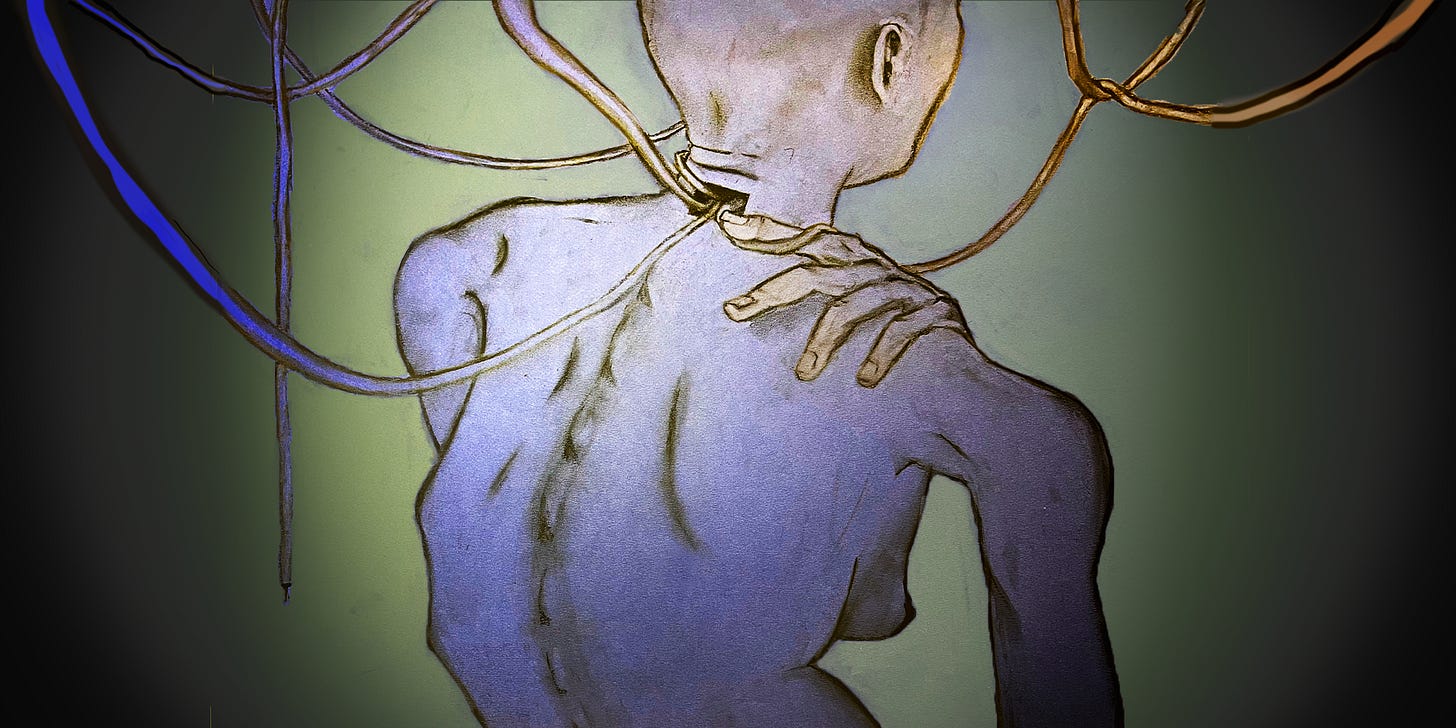mixed feelings is a bi-weekly advice column. Every other week, a different mental health expert or writer will respond to your most pressing existential conundrums. If you’re dealing with one right now, use our anonymous form to be considered for a future newsletter. This week, writer Lee Tilghman explores what it means to “unplug” from social media.
dear mixed feelings,
I hate who I become when I’m scrolling. I’m bitter and judgmental — it’s not who I want to be...what with the comparison culture and the highlight reel of it all. I talk about this with my friends and they always say that I can "unplug" and "delete my socials" if I really wanted to, but it doesn’t seem that easy.
I don’t think I’m at a place where I can be completely off the grid. So much of what I connect to with others is through what's circulating online. I love meme culture and watching dumb TikTok videos and frankly, I can’t see myself doing my job without being tapped in. But I know I need to do something about my relationship with social media. Why does it always feel like social media is either all in or all out? It feels disingenuous when people say you can just unplug from it all. Do I just have to accept being a little unhappy all the time because I'm not willing to give it up? If I did give it up, would I actually be happy? — HappySad, she/her

dear HappySad,
Once upon a time (from 2014-2020) I shared nearly every waking moment of my life on Instagram. My job (wellness influencer) was to let my audience (hundreds of thousands of followers) know what I was eating, when I was going to the gym, what exercises I was doing, where I was traveling, where I was buying my clothes, when I was getting my period, when I was sick, when I was not sick, and when I was happy, sad, scared, anxious, or relaxed.
Work was life and life was work. Since I was mostly on camera all day every day, people could tell when I was upset or going through a breakup, and I’d feel pressure to share things before I was actually ready. The amount of likes my content got became the deciding factor in how I felt that day — similar to when I hyper-focused on calories while struggling with an eating disorder, I was hyper-focusing on likes. It was a terrible, dark, lonely time, and I wouldn’t wish that state of mind on anyone.
As you can probably imagine, this didn’t last. I eventually burnt out and went dark. I deleted IG from my phone, cut my hair, and went to treatment (for my eating disorder that I considered a ‘healthy diet’). During this time, I was extremely offline, pretending social media didn’t exist.
If a friend tried to show me something on Instagram, I’d push the phone away so as not to break the spell I had cast of living in a “cyber-less world”. When I was online, I had an almost parasocial relationship with myself: “Who would @leefromamerica date? Where would @leefromamerica vacation?” I began to think of myself as a brand, as an entity. I needed to un-train my brain from thinking strictly about my life through the lens of social media.
For a while, this total rejection worked. It created this beautiful bubble where I learned to live for myself again, not for likes. I needed a total, cold-turkey breakup with Instagram.
But once I began to heal, I found living offline isolating in its own way. Though social media is its own intangible world, it directly impacts our day-to-day lives. Look what Barbie did, and the Kai Cenet riot in Union Square. And why is everyone using the same exaggerated mannerisms? What we see and consume online impacts how we dress, what music we listen to, our spending habits, where we vacation, where we live, where we go to college, what career we choose, and more. Even if you’re not online, you’re still grazing and encountering social media trends every single day.
At the same time, there are nuanced benefits to being online. We can use social media to enhance our lives, find community, solace, and support when we may not be getting it in the real world. People can find love. Families can stay in touch and watch loved ones grow up from afar. We can stay connected, as long as we stay aware.
As much as I worked to pretend social media didn’t exist, it does. And though I definitely had some social media-related trauma from overuse, I wondered if there was a way to approach it differently and with more moderation.
So now I find myself in the present, where I am somewhere in the middle. I am not extremely offline, nor am I living 100% online. Depending on the day, month, or year, I can fall anywhere on the spectrum of on to offline. I have both IRL and URL worlds.
“moderation,” but how?
Nearly 50% of people report feeling jealous when using social media. It’s a pretty common thing to feel when scrolling through your feed. It’s almost as if the platform itself was built to incite envy and feelings like you described — bitterness, anger, judgment. (But I digress.)
That being said, I try to zoom out and think about my social media consumption as a long game. If we are expected to be on it for the duration of our lives, we must approach it with bodily awareness and balance. So, what does this mean? The key is to understand exactly what you’re gonna get when you go on social media, and to take mini breaks when it’s necessary to reset.
I try to limit my usage when I’m feeling low or triggered. Say you’ve just been let go, it’s probably not the best idea to spend the night alone in your apartment scrolling LinkedIn looking at all the new job announcement posts on your feed. That app is a place where people celebrate new professional milestones — so take it easy until you’re feeling ready to tackle the job hunt.
Knowing your triggers is a great way to build awareness and stop yourself from diving deeper into a negative emotion — sometimes called spiraling — and begin to seek healthier coping mechanisms.
so, you’re “hurt hunting”
You’ve probably gone down a rabbit hole on social media, seeking out a specific profile or search term you know will set you off. This has real-world consequences, as we see in some of the most extreme cases of people becoming radicalized through extremist groups online.
But for the rest of us, maybe it seems like you’re trying to magnify the negative emotion. Why would you be purposefully trying to access negative emotions through social media, you ask?
Therapist Isabelle Wilkinson says this serves a function. “Purposefully triggering negative emotions in ourselves can be an outlet for these feelings which are repressed,” she says. “This not only validates our feelings of pain and sadness, but also presents an opportunity to process the emotions in hopes of better understanding them, and thus, ourselves”. Wilkinson refers to this behavior as “hurt hunting”, and since hearing that phrase, I’ve been so much more aware of this pattern of behavior within myself.
I don’t strive for perfection. If I “hurt hunt” and purposefully trigger myself, I remember that it’s okay, I’m only human. My favorite tools for accidentally overscrolling are to walk my dog, get outside and/or, call a friend. I also check in with myself a lot: Am I stressed? Am I lonely? Am I trying to distract myself? Being able to note these things helps me figure out what I need so that I can get out of my head and into my body.
50/50
For so many of us, unplugging is not a reality. But mini breaks can be! When I have reached my limit and need a reset, I delete the inciting app (IG, TikTok) from my phone’s home screen. This requires no deletion of accounts — I’ve just removed my thumb’s ability to mindlessly scroll. Instead, I try to spend more time doing things I love: walking around my city, time with loved ones, doing something with my hands like cooking or baking. And when the time comes, simply re-download and sign back into your accounts with a refreshed, calmer approach.
We live in a society where black-or-white thinking is the answer to everything that makes us uncomfortable. Unhappy with your body? Go on a crazy diet and exercise DAILY! A person you’re dating who doesn’t agree with everything you say? Dump them! Unhappy at your job? Quit and become an entrepreneur! Although these pseudo-solutions may bring temporary solace, in the long run, they generally don’t. We don’t need to shrink our bodies, maybe we need to just be okay with the way they are. We don’t need to dump someone at the slightest disagreement, we may just need to find healthier means of managing conflict. We don’t need to girlboss to be happy, we can just be a worker among workers. The same goes for social media — it doesn’t need to be all or nothing.
If you’re like me, going off the grid completely means missing important updates from my west coast friends on engagements, new babies, new jobs or big moves. It means missing out on hilarious TikToks. It means missing the memes about And Just Like That from @everyoutfitonSATC. It has a cost, just like everything else we do in life.
But, for me, and maybe for you, the answer lies somewhere in the middle. This is my exploration — maybe I’ll see you there.












